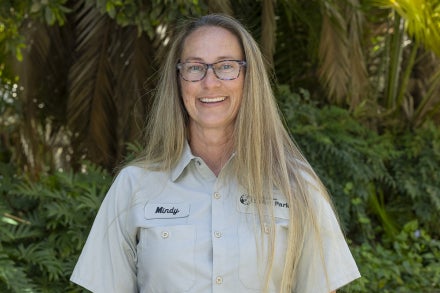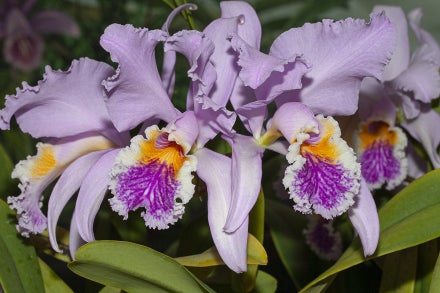
It’s not an exaggeration to say that 2020 has been a challenging year for everybody, including the California condors. Our efforts in raising condors are well known, particularly using a puppet to rear chicks in cases where the parents cannot. Puppet rearing is a helpful tool in preparing condors for reintroduction to the wild, but it can be very labor intensive. This year was—and still is—one like no other, so we really hoped the condors could be as independent as possible this season, because we might not be able to provide as much assistance as usual.
This year, we had seven California condor chicks hatch at the San Diego Zoo Safari Park. Fortunately, we were able to get all of them to hatch under parents or, in some cases, foster parents. We even had an unpaired, single male raise a chick all by himself – normally both parents are involved in raising a chick, so he had to pull double duty!
At the same time, our Andean condor pair, Braulio and Carlotta, produced a fertile egg. If this egg were to hatch, it would only be their second chick together, so it would be very important to the North American zoo population. But, due to their inexperience together, we were concerned that they might not be able to successfully raise their chick this year. We have been trying to improve their chances for success very slowly and patiently over the last couple of years, but during incubation, their behavior wasn’t as cooperative as we would have liked, and we were growing more concerned about the egg’s future. Normally, we would have puppet-reared this Andean condor chick, but things were different this year.
Meanwhile, our sixth California condor chick, which was being raised by her parents, male Towich and female Sulu, began showing signs of sickness and weakness when she was just 36 hours old. Our avian care specialists noticed this and sprang into action, but by the time we were able to retrieve the chick from the nest, she unfortunately had already died. She had an acute and fast-acting yolk-sac infection she contracted during hatch. Although rare, this can happen in any species of bird, and in no way was the result of Towich or Sulu’s care. When the chick was removed from the nest, we left a fake egg—called a “dummy egg”—as a place holder, just to keep them interested in the nest. The hormones involved in nest care are very strong, so they started to sit on it right away.
Our Andean condor egg was nearly ready to hatch. Since California condors Towich and Sulu just lost their chick, we decided to give them an opportunity to raise this Andean condor as their own. As long as the natural history and feeding behaviors are similar, one species can act as a surrogate for another. This is called “cross-fostering.”
Towich and Sulu had cross-fostered once before, when they raised an Andean condor in 2004, so we felt very confident that they would do a good job. When the time was right, they expertly accepted the hatching egg, and on April 30, at 10:45 a.m., a male Andean condor hatched with some help from foster mom Sulu! We named him Mendoza, which is the province in Argentina from where his father, Braulio, is from. He is now 115 days old and is exploring the perimeter of his nest. His flight feathers are still developing, so he is not ready to fledge, or leave the nest, yet. Andean condors fledge at approximately 180 days old, so Towich and Sulu still have some work to do.
Andean condor chicks have black skin, while California condor chicks have light pink skin, but their behaviors are very similar. If Towich and Sulu notice that this chick doesn’t look like them, or any of their recent chicks, they don’t seem to care. They are just raising “their” baby with the same devotion that they normally do.
We animal care specialists are given lots of praise and compliments for helping the animals in our care. In actuality, the animals themselves are the heroes, whether they try to be or not. They do it naturally; all they need is the opportunity. Either during a pandemic or for wildlife conservation, Towich and Sulu are showing us that we are ALL in this together!
Join us in honoring vultures of all kinds on International Vulture Awareness Day, Saturday September 5, 2020. Visit our special page of things to watch, discover, and do.
Ron Webb is a senior animal care specialist at the San Diego Zoo Safari Park. Read his previous story, Vultures: The Gastronomic Marvel.



